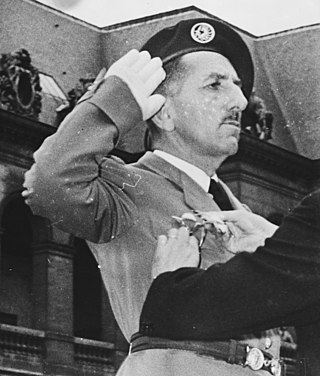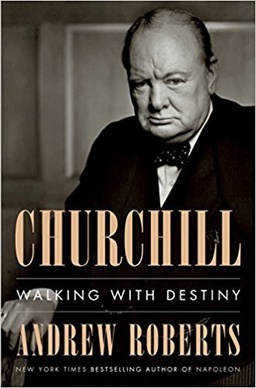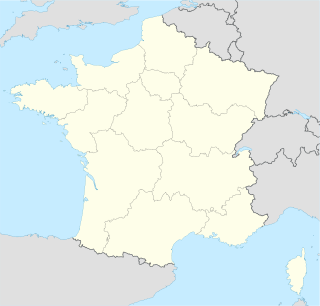
Charles André Joseph Marie de Gaulle was a French army officer and statesman who led the Free French Forces against Nazi Germany in World War II and chaired the Provisional Government of the French Republic from 1944 to 1946 in order to restore a republic in France. In 1958 amid the Algerian War he came out of retirement when appointed Prime Minister by President René Coty. He rewrote the Constitution of France and founded the Fifth Republic after approval by referendum. He was elected President of France later that year, a position which he held until his resignation in 1969.
The General or The Generals may refer to:

Julian Patrick Barnes is an English writer. He won the Man Booker Prize in 2011 with The Sense of an Ending, having been shortlisted three times previously with Flaubert's Parrot, England, England, and Arthur & George. Barnes has also written crime fiction under the pseudonym Dan Kavanagh. In addition to novels, Barnes has published collections of essays and short stories.

The Appeal of 18 June was the first speech made by Charles de Gaulle after his arrival in London in 1940 following the Battle of France. Broadcast to France by the radio services of the British Broadcasting Corporation (BBC), it is often considered to have marked the beginning of the French Resistance in World War II. It is regarded as one of the most important speeches in French history. In spite of its significance in French collective memory, historians have shown that the appeal was heard only by a minority of French people. De Gaulle's 22 June 1940 speech was more widely heard. The historic importance of these radio broadcasts and de Gaulle's future status as the emblem of the French resistance gave de Gaulle the nickname L'Homme du 18 juin.

The Fifth Republic is France's current republican system of government. It was established on 4 October 1958 by Charles de Gaulle under the Constitution of the Fifth Republic.

The Casablanca Conference or Anfa Conference was held in Casablanca, French Morocco, from January 14 to 24, 1943, to plan the Allied European strategy for the next phase of World War II. The main discussions were between US President Franklin Roosevelt and British Prime Minister Winston Churchill. Stalin could not attend. Key decisions included a commitment to demand Axis powers' unconditional surrender; plans for an invasion of Sicily and Italy before the main invasion of France; an intensified strategic bombing campaign against Germany; and approval of a US Navy plan to advance on Japan through the central Pacific and the Philippines. The last item authorized the island-hopping campaign in the Pacific, which shortened the war. Of all the decisions made, the most important was the invasion of Sicily, which Churchill pushed for in part to divert American attention from opening a second front in France in 1943, a move that he feared would result in very high Allied casualties and not be possible until 1944.

Jacques Émile Massu was a French general who fought in World War II, the First Indochina War, the Algerian War and the Suez crisis. He led French troops in the Battle of Algiers, first supporting and later denouncing their use of torture.
Jonathan Fenby CBE is a British analyst, author, historian and journalist.
Andrew Hussey OBE is an English historian of French culture and biographer. He has published multiple books, focusing primarily on 20th century French history and biography.

Maurice Challe was a French general during the Algerian War, one of four generals who took part in the Algiers putsch.
The May 1958 crisis, also known as the Algiers putsch or the coup of 13 May, was a political crisis in France during the turmoil of the Algerian War of Independence (1954–1962) which led to the collapse of the Fourth Republic and its replacement by the Fifth Republic led by Charles de Gaulle who returned to power after a twelve-year absence. It started as a political uprising in Algiers on 13 May 1958 and then became a military coup d'état led by a coalition headed by Algiers deputy and reserve airborne officer Pierre Lagaillarde, French Generals Raoul Salan, Edmond Jouhaud, Jean Gracieux, and Jacques Massu, and by Admiral Philippe Auboyneau, commander of the Mediterranean fleet. The coup was supported by former Algerian Governor General Jacques Soustelle and his activist allies.

My Life in Orange: Growing Up with the Guru is an account of a child growing up in the Rajneesh movement led by Bhagwan Shree Rajneesh. The book is a firsthand account, written by Tim Guest at the age of 27, years after his experiences. The book was published in 2004 by Granta Books. The book's title is a reference to the term "the orange people", which was used to refer to members of the Rajneesh movement due to the color they dyed their clothes.

The Fight to Save Juárez: Life in the Heart of Mexico's Drug War is a 2013 book by Ricardo C. Ainslie, a professor at the University of Texas at Austin. It is published by the University of Texas Press and documents the Mexican Drug War in Ciudad Juárez in the years 2008-2010.

The Levant Crisis, also known as the Damascus Crisis, the Syrian Crisis, or the Levant Confrontation, was a military confrontation that took place between British and French forces in Syria in May 1945 soon after the end of World War II in Europe. French troops had tried to quell nationalist protests in Syria at the continued occupation of the Levant by France. With heavy Syrian casualties, British Prime Minister Winston Churchill opposed French action and sent British forces into Syria from Transjordan with orders to fire on the French if necessary.
The foreign policy of Charles de Gaulle covers the diplomacy of Charles de Gaulle as French leader 1940–1946 and 1959–1969, along with his followers and successors.

Churchill: Walking with Destiny is a non-fiction book authored by British historian and journalist Andrew Roberts. Viking Press published it within the United States in 2018, while Allen Lane published it within the United Kingdom.

Free French Africa was the political entity which collectively represented the colonial territories of French Equatorial Africa and Cameroon under the control of Free France in World War II.

The French National Committee was the coordinating body created by General Charles de Gaulle which acted as the government in exile of Free France from 1941 to 1943. The committee was the successor of the smaller Empire Defense Council.

André Diethelm was born in Bourg-en-Bresse and was a French Resistance fighter and politician. As an Inspector General of Finance, he joined General de Gaulle and Free France during the Second World War, and presided over the Rally of the French People political party under the Fourth Republic.

This is a list of works which deal with France and its geography, history, inhabitants, and culture.
















